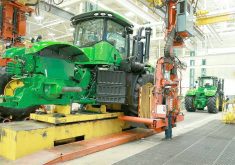Arecent visit to the Fraser Valley brought a sensory highlight clearly to mind. Valley farmers were in the midst of spreading manure onto recently harvested fields. To those of us in agriculture this would just be part of the annual production process and of no particular consequence. However to non-agriculture folk living nearby this practice is deemed to be an atrocious, malodorous, unhealthy and rather disgusting, and those are the mild descriptions.
One could dismiss those complaints as typical griping by city folks who chose to live near agricultural operations, being if they don’t like it they should have known better, or perhaps should just move away. Be that as it may, that’s unlikely to happen in areas like the Fraser Valley. What’s more likely to happen is that those non-farming voters will ask their politicians to do something about the practice. In the valley, restrictive regulations are already in place and are bound to get worse.
Read Also

Deep cuts to ag research jeopardize Canada’s farming future
The huge cuts to ag research at Agriculture Canada are being widely panned by farm organizations, but there seems to be little hope of the government reversing its decision.
There are well over 500,000 people living in the valley and their numbers are growing with new housing developments. On the other hand, agriculture is increasing rather than diminishing, thanks to intensification. Dairy farms in particular are expanding, with 500-plus milking cow operations becoming common. The last 25 years has seen milk quota being bought up from small interior dairy farms and transferred to the mega-operations in the valley.
The side effect is vast new quantities of manure looking for a home. The sight of huge liquid-manure spreading tankers pulling off of fields onto to suburban side streets is surely aggravating to the many thousands of local homeowners. It’s just a matter of time before those annoyed locals are going to severely react against such practices.
Take action
What has all that got to do with Alberta? We could learn from that situation and take a great leap forward to what is being done in parts of Europe, such as Denmark and the Netherlands. A few large industrial-size biodigesters could be built in the Lethbridge area to take manure, sewage sludge, vegetable waste etc. Such a bold move would nip in the bud any attempt by over-zealous municipal politicians to restrict manure spreading on fields. It’s also a better use for what is actually a resource.
The reason we need a big leap forward is also because of the propensity of our research community to repeat history. A few years ago money was spent researching composting, and then small-scale biodigesters. That would be the same research that was done over 35 years ago in Europe. On-farm digesters have been proven to work but they are not able to go to the tertiary level of breaking down manure to its components, all of which have value. I should say that private initiatives are in the midst of developing next generation bio-digesters which have use on commercial operations. But it’s not enough.
Industrial-scale plants would be able to take in more than just commercial quantities of manure, but also other organic waste that would otherwise go to landfills. Lethbridge food-processing plants produce plenty of that material. What about incorporating unwanted rendering material from livestock processing?
So who is going to pay for these plants? There are precedents blowing in the wind so to speak. Bio-digesters produce methane, which could be used to produce electricity or used as natural gas, both of which could be sold into grids. Windmills receive tax incentives and premiums for the power they produce – why not premiums for bio-power? Municipalities spend large sums on building and maintaining landfills, why not on bio-digesters? They also act as waste-disposal sites. Provincial governments provide large grants to build sewage-treatment plants that amount to hundreds of millions of dollars for the big cities, why not for bio-plants? Don’t they provide a similar service?
Processing plants and commercial agriculture operations are all faced with waste-disposal costs. Surely they could see benefit in paying for the use of a bio-digester. Besides I expect that governments will sooner or later force the issue and restrict the spreading of manure near urban areas for health reasons. I expect Fraser Valley animal agriculture will soon be faced with that reality.
It’s been said that bio-power is all a matter of perspective. Wind power is considered clean energy and is the darling of the green movement. Bio power doesn’t have the same image, being manure is considered to be toxic waste by city folks and out of sight out of mind is the preferred approach, until of course it comes home to roost on sensitive city slicker nostrils on the prevailing winds.
We need a great leap of faith– at least governments should provide the financial incentive to private enterprise to take the step – it worked for wind power. Maybe back it up with the implication that restrictive regulations are just down the road. That worked in Europe and it can work here without repeating history.













